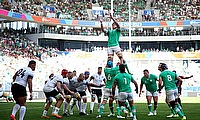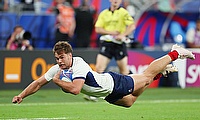England need to embrace the optimism
This time last year, I was writing a piece on England's chances in their first Six Nations under the tutelage of Stuart Lancaster. People were expecting a new, sexier England team to emerge from the ashes of a doomed World Cup campaign: a team that would sacrifice experience for raw talent and usher in a fresh dawn of English rugby.
Twelve months on, and England's head coach must be applauded for the development that he has overseen at Twickenham. Following a successful Six Nations at the start of 2012, in which their only loss came at the hands of the Grand Slam champions elect, Wales, Lancaster's men provided stern opposition to a dominant South Africa side in their summer tour. Despite winning none of the three tests, England displayed a resilience and determination that had been previously lacking. In the autumn series, uninspiring performances against Australia and South Africa forced England supporters to question the Lancaster philosophy for the first time. A week later, and they recorded their most significant international victory since the World Cup final of 2003, beating world champions New Zealand 38-21 in a dominant display that symbolised the distance this new England squad had come under new leadership.
In the wake of taming the All Blacks, England have suddenly been thrust into the rugby spotlight ahead of this year's Six Nations. Such expectation means that Lancaster and co are dealing with the title of 'favourites' for the Grand Slam, an epithet that has rarely been granted since Sir Clive Woodward called the shots. Some voices in the rugby world are echoing these sentiments, due in part to the questionable quality of the other northern hemisphere sides at this point.
Whilst Wales search to end a desperate losing streak that stretches back to their Grand Slam success of last season, Ireland continue to teeter between two rugby generations that have yet to mesh coherently. Further down the scale, Italy are still several seasons away from seriously challenging in this European contest, and while Scotland begin a new period in their history under Scott Johnson, it remains to be seen whether they have enough quality throughout their squad to go toe-to-toe with the other British nations. France, enigmatic as ever, are impossible to predict, but have shown few flashes of brilliance since their successful World Cup campaign in 2011.
The optimism surrounding English rugby may, then, seem well placed. However, you do not have to delve too far into the annals of history to see that confidence garnered too quickly can lead to a rapid downfall.
England's disastrous performance at the 2011 World Cup was coupled with well-publicised off-field controversies that ultimately cost Martin Johnson his job, and yet such disappointment came merely nine months after his side had claimed their first Six Nations title since 2003, amidst the promising arrivals of Chris Ashton and Ben Youngs to the international scene.
Lancaster must be quick to remind his current crop of talent that such a demise is not beyond the realms of possibility this term, and over-confidence would be a key player in such a negative turnaround.
In another check to England's rising optimism, former Scotland coach Jim Telfer claimed this week that England had become "too arrogant since the New Zealand victory. In the interview, he stated that "if they had played another five times, the All Blacks would have won them all. Such comments appear shocking to the ear of English fans still revelling in the pride of such a success, but Telfer's words should provide a warning to a side brimming with confidence: the rest of the rugby world is out to get them.
Whilst the self-belief that has been garnered by last year's results can be wielded as a motivational tool, Telfer's comments have illustrated that it can be equally used as a form of psychological warfare. If England are to claim a famous Grand Slam success, starting at home to Scotland on Saturday, they must first ensure that the optimism surrounding them does not overcome the squad, and this could prove to be as difficult a task as Lancaster's young side have yet experienced.
All of this is not to say that they should adapt their style of play to try and undermine comments of arrogance: they are favourites for a reason, after all. Pessimism is such a common trope of English sport that when it is replaced by hopeful positivity. When England take to the field on Saturday afternoon, they'll be greeted by the roar of 80,000 optimistic partisans who are desperate for a further taste of international glory. We can only hope that our optimism is well placed.








